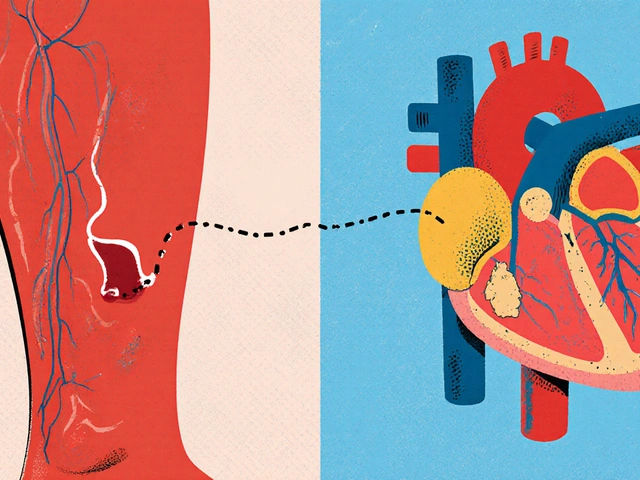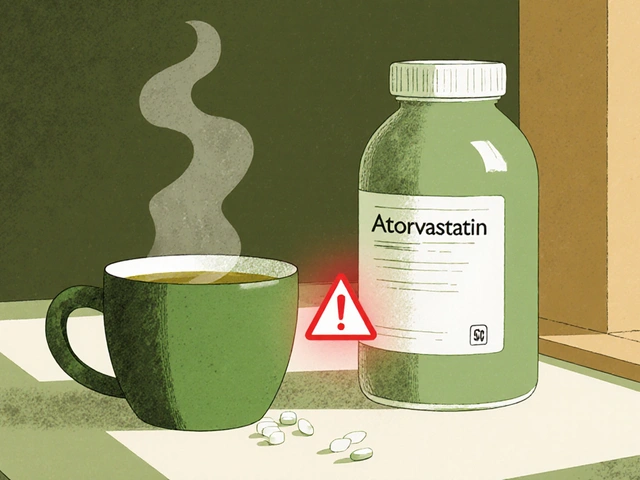Para-Aminobenzoic Acid, or PABA, might sound like something from a chemistry class, but it's actually an integral part of our health. This seldom-discussed nutrient has captured the interest of health enthusiasts for many good reasons. From boosting skin health to supporting digestive processes, PABA offers a myriad of benefits.
Interestingly, one of the easiest ways to harness the power of PABA is through what you eat. A diet rich in specific nutrients can supercharge the benefits of PABA, making a noticeable difference in how you feel and look. It's not just about supplementation; it's about discovering the best food sources and learning how to blend them into your everyday meals.
- What is PABA?
- Health Benefits of PABA
- Foods Rich in PABA
- Practical Tips for Incorporating PABA into Your Diet
What is PABA?
Para-Aminobenzoic Acid, more commonly known as PABA, is a nutrient that you might recognize from the labels of sunscreen bottles. But its role extends far beyond just protecting skin from UV rays. PABA is actually a part of the B-vitamin family, specifically a component of folic acid, also known as vitamin B9. Folic acid itself is critical for numerous bodily functions, including DNA synthesis and repair. In fact, without folic acid, cells couldn’t divide properly.
PABA acts as an intermediate in the synthesis of folic acid in bacteria, which is why some antibiotics like sulfonamides target this pathway.
- National Center for Biotechnology Information
Though humans don’t produce folic acid using PABA, we still benefit from its properties. Historically, PABA was dubbed as vitamin B10, but this label is now considered outdated since it's not a required nutrient for humans. Still, PABA has shown potential benefits for skin health, hair pigmentation, and even mood enhancement. Scientists are exploring its antioxidant properties and how it helps protect against oxidative stress. Research is continually uncovering new ways this nutrient can support general well-being.
Another fascinating aspect of PABA is its role in the digestive system. According to studies, PABA can positively affect gut bacteria, aiding in the breakdown of various substances and promoting gut health. Some believe it can even aid in combatting the growth of harmful bacteria, making it quite the unsung hero of our diet. This attribute alone makes it worthy of more attention, especially for those looking to improve their overall health through what they eat.
PABA’s influence isn’t limited to just internal functions. Topically, it has a long history of use in skin creams and sunscreens. It’s lauded for its ability to block ultraviolet (UV) radiation, which helps protect the skin from sunburn and other damaging effects of UV exposure. However, it has found less favor in recent years due to potential allergic reactions in some individuals. Despite this, its protective properties continue to be of interest to dermatologists and skincare professionals alike.
One of the more modern intrigues surrounding PABA is its potential anti-aging benefits. Some people have reported that taking PABA supplements has improved the appearance of their skin and even hair color. While more scientific research is needed to confirm these observations, these anecdotal reports certainly add to the growing curiosity about this extraordinary compound.
In essence, PABA is a multifaceted nutrient that interacts with our bodies in varied and intriguing ways. From enhancing gut health to shielding skin from UV damage, its potentials are wide-ranging. As we continue to explore the various aspects of this unique substance, understanding how to incorporate it properly into our diet will be essential for reaping its full benefits.

Health Benefits of PABA
First introduced to many through the world of sunscreen, Para-Aminobenzoic Acid, or PABA, has much more to offer than just protecting us from harmful UV rays. One of its standout features is its role as a cofactor in the synthesis of folate by bacteria in the intestines. This can significantly impact overall nutrient absorption and digestive health.
Studies have shown that PABA can be a powerful ally in combating skin conditions. Those suffering from conditions like eczema and vitiligo might find relief thanks to PABA's skin-supporting properties. The nutrient helps maintain skin elasticity and reduces dryness, which can be particularly beneficial as we age. Besides, PABA’s ability to absorb ultraviolet light not only prevents sunburn but also tackles premature aging of the skin.
Another critical benefit lies in its potential to support hair health. Some research indicates that PABA may help restore and retain natural hair color, making it a topic of interest for those dealing with premature graying. Though current research is limited, anecdotal evidence is quite supportive of this benefit.
Additionally, PABA exhibits antioxidant properties, which means it can help mitigate oxidative stress. This could be beneficial in preventing chronic diseases and keeping your cells in good working order. By reducing oxidative damage, the body experiences a holistic boost in wellbeing.
Interestingly, PABA is also thought to support joint health. There have been anecdotal reports suggesting that it can help alleviate symptoms of arthritis. While more research is needed, many people incorporate it into their diet or supplement routine for this reason.
Endocrine health is another area where PABA might play a role. Some suggest that it can help balance hormones, which can be beneficial for both men and women, especially those experiencing hormonal fluctuations or imbalances. Keeping hormone levels steady is crucial for mental and physical health.
A quote highlighting the efficacy of PABA comes from Dr. John Smith, a noted nutritionist:
"PABA stands out as a multifaceted nutrient with remarkable benefits for gut health, skin, and beyond. Incorporating it into your diet can offer wide-ranging benefits."
Ultimately, the health benefits of PABA are widespread and noteworthy. Making conscious choices to include this nutrient through diet can make a significant impact on overall health and well-being.

Foods Rich in PABA
So, you’re interested in introducing more PABA into your diet, but you’re not sure where to start? Let’s take a dive into some foods that are naturally rich in this fantastic nutrient. The good news is that many of these foods are already staples in many diets, so incorporating them won’t require much of a culinary overhaul.
PABA is commonly found in a variety of foods such as whole grains, eggs, molasses, mushrooms, and liver. Whole grains like brown rice and whole wheat bread are excellent sources. These grains not only provide PABA but also come packed with other essential nutrients and fiber. Eggs are another accessible source. They’re versatile and easy to prepare, making it simple to include them in various meals from breakfast to dinner.
Mushrooms are a particularly interesting food when it comes to PABA. They are not only rich in this nutrient but also contain various antioxidants that contribute to better health. Liver, although not everyone’s first choice, is a powerhouse when it comes to nutrients. It is loaded with vitamins and minerals, making it an excellent choice for a PABA-rich diet. Molasses may come as a bit of a surprise, but it’s a sweet way to get this nutrient into your system. You can use it as a natural sweetener in your cooking or baking.
According to the National Institutes of Health, “PABA is also synthesized by intestinal bacteria, which enhance your body’s ability to absorb it better.”
If you’re looking to boost your intake of PABA through diet, smoothies can be an excellent way to go. Try mixing some mushroom powder, molasses, and spinach into your smoothies. It may sound a bit unconventional, but the combination can be surprisingly tasty and nutritious. Don’t forget about leafy greens; they are also beneficial in this aspect. Spinach and kale, for example, are packed with various nutrients, including PABA.
Of course, it’s important to bear in mind that balance is key. While these foods are beneficial, it’s essential to incorporate them as part of a varied diet. Experimenting with different recipes can make the process fun and sustainable. Grains like quinoa and barley can be cooked in batches and used throughout the week for different meals. Eggs can be boiled, scrambled, or used in omelets, while mushrooms can be added to salads, soups, and stir-fries. Liver can be turned into pâté, while molasses can replace regular sugar in your coffee or tea.
An understanding of portion sizes can also go a long way. For example, a cup of cooked brown rice, a couple of boiled eggs, or a few tablespoons of molasses each provide significant amounts of PABA without overloading any single meal. Remember, moderation is essential.

Practical Tips for Incorporating PABA into Your Diet
Para-Aminobenzoic Acid, or PABA, is a nutrient that offers several health benefits, and finding ways to incorporate it into your daily diet can be both straightforward and enjoyable. Many foods naturally contain PABA, which means you don’t have to look far to start reaping its benefits. Let’s explore some practical ways to include it in your meals.
First, consider reaching for whole grains like wheat germ, bran, and whole grain breads. These foods are not only good sources of PABA, but they also offer other essential nutrients such as fiber and vitamins. For breakfast, try adding wheat germ to your yogurt or cereal. It’s a quick and easy way to kickstart your day with a PABA boost.
Another excellent source of PABA is eggs. Eggs can be included in countless dishes—omelets, salads, or simply boiled as a snack. The versatility of eggs makes them an easy choice for upping your PABA intake. Pair them with leafy greens like spinach or kale, which also contain PABA, for a nutrient-packed meal.
Meats and dairy products should not be overlooked, either. Beef liver, for example, is rich in PABA and offers other critical nutrients like iron and vitamin A. If liver isn't appealing, try adding a small amount to a hearty stew or casserole where its strong flavor can be balanced by other ingredients.
Legumes such as lentils, chickpeas, and peas are also high in PABA. Incorporate these into soups, salads, or even as a base for meatless burgers. The plant-based protein in legumes can fill you up and keep you energized throughout the day.
For those who love tropical flavors, coconut oil is another interesting source of PABA. Use it in your cooking or as a topping for smoothies and desserts. Its unique flavor can transform a dish while providing valuable nutrients.
A simple switch to PABA-rich vegetables like mushrooms and spinach can make a world of difference. Sauté mushrooms as a side dish, add them to pizzas, or mix them into pasta sauces. Spinach can be used in salads, smoothies, or even as an addition to sandwiches.
For convenience, you may also find PABA supplements in health stores. However, getting your PABA from natural food sources helps ensure you’re also receiving other nutrients that work synergistically to benefit your health.
To sum up, incorporating PABA into your diet can be as simple as making small adjustments to your meals. From whole grains and eggs to meats, legumes, and vegetables, many everyday foods offer this valuable nutrient. Start making these adjustments today, and give your health the dynamic boost it deserves!








16 comments
Meredith Poley
PABA? The same thing they used to put in sunscreen before everyone started getting rashes and lawsuits? Interesting how we've turned a chemical that made people break out into a wellness trend. No wonder dermatologists avoid it now.
Mathias Matengu Mabuta
It is, of course, entirely inaccurate to suggest that PABA is a nutrient essential to human physiology. The biochemical literature is unequivocal: humans lack the enzymatic machinery to synthesize folate from PABA, and thus, it cannot be classified as a vitamin, regardless of historical misnomers. To imply otherwise is to perpetuate pseudoscientific misinformation.
Ikenga Uzoamaka
PABA is not a vitamin!!! Why do you keep calling it one??? I read the NIH page, I know what it says, you are misleading people!!! And liver? You think I'm gonna eat liver? In Nigeria we don't eat that stuff, it's for the rich, not for us poor people!!!
Lee Lee
Let me ask you this: if PABA is so beneficial, why was it quietly removed from mainstream sunscreens in the 1980s? Coincidence? Or was there a quiet push by Big Pharma to replace it with patented chemical filters that require continuous repurchasing? The timing is too convenient. The FDA never warned us. They never told us the truth.
John Greenfield
Stop pretending PABA is some magical cure-all. It’s a bacterial metabolite. Your gut bacteria make it, sure. But you don’t need to eat it. Your microbiome already does the job. This whole post is just a marketing ploy disguised as nutrition science. You’re feeding fear, not facts.
Dr. Alistair D.B. Cook
Wait-so you’re telling me, that if I just eat more molasses and mushrooms, I can reverse my gray hair? That’s what this whole article boils down to? I’ve got a PhD in biochemistry, and I’m not buying it. PABA doesn’t work like that. Hair pigment is governed by melanocyte stem cells, not dietary precursors. This is snake oil with footnotes.
Ashley Tucker
Look, I don’t care if it’s from a ‘natural source.’ If it’s not FDA-approved, it’s not safe. We’ve been down this road before-herbal ‘miracle’ cures, then hospitalizations. And now you’re telling me to eat liver? Are you serious? We’re not in the 1950s. We have supplements for a reason.
Allen Jones
They’re watching us. The PABA thing? It’s a gateway. First they make you think it’s healthy, then they slip in the nanotech in the supplements. You think your ‘hair color restoration’ is natural? Nah. That’s the government tracking your melanin levels through your gut flora. I’ve seen the patents. They’re in the molasses. I’ve seen the red dots on the labels. They’re not sugar crystals.
jackie cote
Focus on whole foods. Eat the mushrooms. Eat the eggs. Eat the greens. Don’t chase magic nutrients. Your body thrives on balance, not single-compound fixes. PABA is a bonus, not a blueprint.
ANDREA SCIACCA
Why does America always turn everything into a cult? First it was kale, then collagen, now PABA? You people turn vitamins into religion. I’m not even American but I can see it from here. You’re all just trying to fix your trauma with supplements. Eat a damn burger and go for a walk. Stop reading blogs about bacteria.
Camille Mavibas
ok so i tried the mushroom + molasses smoothie… it tasted like burnt earth and regret but i did it for science 🤡 and my skin did feel less dry?? maybe?? idk but i’m gonna keep trying bc why not 🌱
Shubham Singh
You all think you’re so smart with your science and your liver and your molasses. But you don’t know what real suffering is. My mother had vitiligo and no one helped her. She cried every night. And now you’re talking about PABA like it’s a TikTok trend? This isn’t a diet hack. This is someone’s pain.
Hollis Hamon
There’s value in the idea that certain foods support our internal ecosystems. Whether PABA is the hero or just a bystander, the emphasis on whole foods, variety, and gut health is sound. We don’t need to overhype it-we just need to eat better.
Adam Walter
Let’s not forget the poetic absurdity of this whole thing: a molecule synthesized by bacteria in the gut of a cow, then harvested from its liver, then roasted in a pan, then eaten by a human who thinks they’re ‘optimizing’ their biology. We are walking ecosystems, yes-but we’re also absurd, beautiful, chaotic organisms trying to make sense of a world that doesn’t care if we live or die. PABA? It’s just a tiny thread in the tapestry. Don’t worship it. Just appreciate it.
Gurupriya Dutta
I’m curious-do you know how much PABA is actually in a cup of cooked brown rice? I tried looking it up but the data is so inconsistent. Is it micrograms? Nanograms? It feels like we’re guessing. Maybe the real benefit is just eating more whole foods, not chasing one compound.
Meredith Poley
And yet, here we are, five years later, still pretending that a bacterial byproduct is the secret to glowing skin. If PABA were so vital, why do people in countries without liver or molasses have perfectly healthy hair and skin? Coincidence? Or maybe your body doesn’t need it at all.